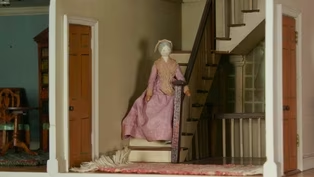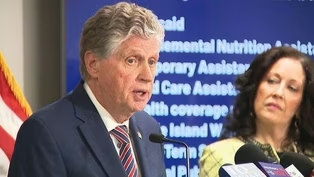
Preventing Overdoses?
Clip: Season 5 Episode 51 | 9m 9sVideo has Closed Captions
The first state-regulated overdose prevention center in the country will open soon.
A new site in Providence will soon allow people to use illegal drugs in plain sight. Rhode Island PBS Weekly takes viewers inside the overdose prevention center.
Problems playing video? | Closed Captioning Feedback
Problems playing video? | Closed Captioning Feedback
Rhode Island PBS Weekly is a local public television program presented by Ocean State Media

Preventing Overdoses?
Clip: Season 5 Episode 51 | 9m 9sVideo has Closed Captions
A new site in Providence will soon allow people to use illegal drugs in plain sight. Rhode Island PBS Weekly takes viewers inside the overdose prevention center.
Problems playing video? | Closed Captioning Feedback
How to Watch Rhode Island PBS Weekly
Rhode Island PBS Weekly is available to stream on pbs.org and the free PBS App, available on iPhone, Apple TV, Android TV, Android smartphones, Amazon Fire TV, Amazon Fire Tablet, Roku, Samsung Smart TV, and Vizio.
Providing Support for PBS.org
Learn Moreabout PBS online sponsorship- Our society has a way of, yes, if you're in recovery and treatment, we're gonna support you.
Until you get here, you're on your own.
- [Michelle] This space has the potential to change that, says Dennis Bailer, by offering support to many who are addicted to drugs.
- This is the Overdose Prevention Center.
This is where the actual life saving comes into play.
- [Michelle] The site in Providence is the first of its kind in the United States.
It's the only state regulated facility where people can use previously obtained drugs under the supervision of trained staff.
- This is one of our two inhalation or smoking rooms.
People will smoke their methamphetamine or their crack cocaine in these rooms.
- [Michelle] Bailer is the Overdose Prevention Program Director at Project Weber/RENEW.
He showed us injection booths, where clients can use illicit drugs like heroin.
Each booth has a mirror, which Bailer says is about safety.
- This allows us from a distance to see the person's face.
We can see where they appear like they may be at the onset of overdose.
- [Michelle] Saving lives is the number one goal.
Staff members are trained to intervene immediately if someone overdoses.
They'll also be able to test drugs for substances like fentanyl and a tranquilizer named xylazine.
- Not everybody who uses has substance use disorder.
We're in a college town.
College students experiment.
College students party a little bit.
We've lost so many young people who don't have substance use disorder to overdose death because of the contamination of their substance.
We hope we can get them into our facility to test their drug.
They don't have to use any of our other services.
- [Michelle] We spoke with a man named Willie, who smokes crack.
He wanted us to hide his face and disguise his voice.
He says he plans to use drugs at the Overdose Prevention Center.
- [Willie] Yeah, I think it's more safe here than you do it by yourself in the street.
- Willie says he's been arrested twice for using crack in public.
He plans to test his drugs at the site for fentanyl.
He's never overdosed, but he worries about it.
Do you know people who have overdosed?
- [Willie] Yes, a lot.
A lot of friends.
A lot of friends died.
Yeah.
They put fentanyl in the crack.
Yeah, a lot.
10, 20 people died already.
- One of the saddest things I visualize is that young person in their mid to late 20s dying behind a dumpster on Broad Street.
I wanna save that life.
I wanna prevent that death.
- [Michelle] Brandon Marshall is a professor of epidemiology at Brown University.
He's been studying harm reduction centers since 2011.
There are more than 200 of these sites around the world, including two that opened in New York City in 2021.
Unlike the one in Providence, those are not state sanctioned.
- Think this is a promising public health intervention that has seen success in Canada, in Europe, in Australia.
Now we need to know, though, does it work in the United States, right?
We have the world's most severe overdose crisis, and we have a healthcare system that's unlike anything else in the developed world as well.
- Marshall says there has never been a deadly overdose at a harm reduction center worldwide.
He expects the Providence site will contribute to a drop in emergency room visits and hospitalizations.
But not everyone's convinced.
There are still those who believe that overdose prevention centers are enabling people who are addicted to opioids.
What do you say to those folks?
- You know, at the end of the day, what these centers are trying to do is connect people to services, and in particular, addiction treatment.
That's one of the main goals.
- [Michelle] Marshall and a team of researchers at Brown will evaluate how the new site in Providence affects the overdose crisis and the local community.
They've already enrolled 250 people who use harm reduction services around Rhode Island.
They'll compare them with another 250 people, who will be recruited directly from the Overdose Prevention Center which is next to the Rhode Island Hospital campus.
- We are following folks for up to 18 months to look at some of their longer term trends in drug use and overdose risk, and we hypothesize that people who use the Overdose Prevention Center will have a lower rate of overdose over those 18 months.
And then we're also looking to see primarily the extent to which people are accessing addiction treatment.
- [Michelle] Project Weber/RENEW has partnered with VICTA, a nonprofit organization that will offer behavioral health, medical, and substance use treatment services.
Clients will also have access to showers and clean clothes.
- When you really bring a person into the fold and show them that love and that concern, they can take that mask off and say, "You know what?
This is just too much.
I'm having a hard time with this."
And with that connection, we can guide a person into treatment and detox and recovery.
- [Michelle] Willie says he wants to get help and to get clean.
He pictures a different life for himself than being homeless on the streets of Providence.
What do you hope your life looks like if and when you decide to quit?
- [Willie] A lot different.
You know, I bet my family would be happy.
My mother, my sister, brothers, my kids, yeah.
I'd be happy.
That's what I wanna do.
- [Michelle] The Overdose Prevention Center is largely funded by opioid settlement money awarded to Rhode Island.
No taxpayer dollars are being spent on the program, which is in a pilot phase until March of 2026.
It remains to be seen whether the state makes it permanent and what may happen under a new presidential administration.
- Well, of course, we're concerned.
We feel the best thing we can do is continue to care for people, prevent the deaths.
- [Michelle] While Marshall is a proponent of harm reduction centers, he says he's committed to reporting on whatever he and his team discover.
- We are not working directly with Project Weber/RENEW or the operator in New York City.
This is an independent evaluation.
- [Michelle] Rhode Island saw a more than 7% drop in fatal overdoses last year compared to 2022, and there are similar signs across the country.
- Nationally, for the first time since the beginning of the crisis, we're seeing pretty sustained significant reductions in overdose deaths.
So, this could be the beginning of the turn of the epidemic.
If we continue investing in programs that work, that are evidence-based, I think we could finally be seeing the light at the end of the tunnel, so to speak.
:
Video has Closed Captions
Clip: S5 Ep51 | 8m 16s | Before Hasbro, there was another famous Rhode Island toy company that helped save Christmas. (8m 16s)
Video has Closed Captions
Clip: S5 Ep51 | 6m 43s | Journalists Michelle San Miguel, Ian Donnis and Ted Nesi discuss the top stories of 2024. (6m 43s)
Providing Support for PBS.org
Learn Moreabout PBS online sponsorship
- News and Public Affairs

Top journalists deliver compelling original analysis of the hour's headlines.

- News and Public Affairs

FRONTLINE is investigative journalism that questions, explains and changes our world.












Support for PBS provided by:
Rhode Island PBS Weekly is a local public television program presented by Ocean State Media

